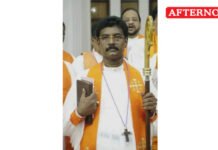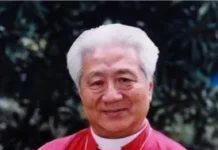The appointment of the Rev. Canon Emily Onyango as assistant Bishop of Bondo in the Anglican Church of Kenya was unlawful and improper, lay members of the diocesan synod have claimed in a 19 January 2021 petition filed with the primate, the Most Rev. Jackson Ole Sapit.
Six lay members of synod have alleged the appointment of Canon Onyango was unlawfully engineered by their bishop, the Rt. Rev. David Kobia in violation of diocesan and provincial canons. They have asked Archbishop Ole Sapit to investigate the circumstances of her appointment and election and to withhold his consent. The appointment of Canon Oyango also threatens to unravel the GAFCON coalition, as the member churches have agreed not to consecrate women bishops at this time.
On 12 January 2021, the Bondo synod affirmed the appointment of Dr. Onyango as assistant bishop. A senior lecturer and dean of students at St. Paul’s University in Limuru, Dr. Onyango earned a PhD from the University of Wollongong in New South Wales and was one of the first women ordained to the priesthood in Kenya in 1984.
If her appointment is affirmed, she would become the fourth African female bishop, following the Rt. Rev. Ellinah Wamukoya of Swaziland (who died last week of COVID -19), the Rt. Rev. Margaret Vertue of False Bay and the Rt. Rev. Elizabeth Awut Ngor assistant bishop of Rumbek.
The petition alleged the episcopal electoral process in Bondo process had been conducted in “complete disregard” of canon law. They further alleged Bishop Kodia used “blackmail, threats, and intimidation” to cajole synod into affirming her appointment.
The petitioners stated the diocese was unable to afford an assistant bishop, stating parish contributions were 13million Kenyan Shillings in arrears, with some clergy not having been paid for almost a year. They further questioned the reason for appointing a bishop at this time. The new bishop would not serve in the diocese but continue her teaching ministry at St Paul’s, but with the title of bishop. “If they can appoint someone then second her back where she came from then they do not need her services.”
Appointing a woman assistant bishop is within the language of the Kenyan canons, but violates informal agreements made by the House of Bishops and Archbishop Ole Sapit.
In 2014 the GAFCON primates adopted a moratorium on the ordination of women to the episcopate in their provinces. The move came after women priests unsuccessfully stood for election in the Anglican Church of Kenya in 2012 and 2014. After the moratorium was introduced, the GAFCON primates created a Task Force on Women in the Episcopate chaired by the Rt. Rev. Sampson Mwaluda of Kenya. Their 2017 report recommended a moratorium be placed on ordaining further women bishops, “as the issue poses a threat to the unity we prize”, former GAFCON chairman Archbishop Peter Jensen of Sydney said.
However, the 24th meeting of Kenyan General Synod held 25-26 September 2019 at All Saints Cathedral in Nairobi, affirmed its support for women bishops. The language of the constitution allows any priest in good standing in the province aged 35 and older to stand for election. The consensus of synod was that the language of the constitution should explicitly state that male or female clergy may stand for election — not relying upon grammar to imply that male pronouns in the language of the constitution include the female. The amendment will not take legal effect until it is endorsed by the 2021 meeting of synod.
Archbishop Ole Sapit reminded synod, however, that he had agreed to honor the GAFCON moratorium and noted the Kenyan House of Bishops in 2015 had voluntarily entered into a five-year moratorium also.
A member of the GAFCON Task Force on Women in the Episcopate, Prof. Stephen Noll, told AI:
“The work of the Task Force on Women in the Episcopate is ongoing, as GAFCON is committed to addressing issues of common concern and church order biblically, in accordance with the Jerusalem Declaration, and collegially. In my view, this action in Kenya is a breach of that commitment and fellowship.”
“It is true that the East African Revival has emphasized egalitarian ministry more than some other provinces; nevertheless they said they were willing to wait for a further consensus. But the precipitate action is reminiscent of actions in the West over the past fifty years, and I would not be surprised to discover that there has been western influence and money involved here as well.,” Prof. Noll said.




This is where those within ACNA pushing WO will end. We must have women priests because we belong to GAFCON and they have women priests. We must have women bishops because we have women priests. Canons be damned. The Diocese of Pittsburgh has been stockpiling women canons. Why not get it over with and choose someone like Rev. Tish Warren as bishop? She is ver eloquent in pushing her vapid Critical Race Theory ideas. Alas, saving souls is so yesterday.
I haven’t had an opinion about Tish Warren before (except that I don’t think women should be priests), but I have one now, after becoming aware of an awful opinion piece she published in Christianity Today on Jan 7, 2021. The Capitol incursion was planned in advance by and executed by QAnon conspiracy theorists along with some Antifa and BLM activists to stir the pot. Warren blames “white evangelical Christians.” Even though all the facts were not available on Jan. 7 (or even now), this is an outrageous take.
She also pushes Critical Race Theory in articles to Christianity Today. The American race thing is a campaign tactic (it worked) which divides us. We in the pews just can’t catch a break. Our secular life is surrounded by all kinds of mixed marriages as well as those sitting next to us. Jeeez. If a white man marries a black woman he is definitely racist because it is no more that a master slave relationship and supports her theory. Enough already.
Is that something she’s actually said? A racially mixed marriage is a master/slave relationship?
An update, a corrective and a conjecture: Tish Warren and her husband Jonathan resigned late last summer from the 2nd largest parish in the Diocese of Pittsburgh and are no longer in parish ministry. The four female ordained Canons on the diocesan staff (Canon Shari Hobby and three others are no more). Mrs. Hobby moved back to FL when her husband Jim resigned as bishop and the other three’s positions were eliminated by the Standing Committee as 1/1/21. I would not at all be surprised that one of the finalists for bishop would be a person opposed to female ordination to the priesthood — that is just my conjecture as a longtime priest in the Diocese of Pittsburgh.
This is very helpful information. Thank you.
And now the drama starts. It would be great if churches could be free of internal politics but being made up of people, that is not likely. These allegations are serious if for no other reason that they imply a serious moral lapse. I also wonder about the idea that they desperately need this new Bishop, but will not be utilizing the Bishop as a Bishop. This again smacks of something more political than spiritual. I also wonder, if their canons allow for female bishops, why all the games? It seems like there is more to this than we will likely ever know from the outside.
However their canons bring up another issue. Does GAFCON ever review cannons when deciding who is or isn’t part of GAFCON? Is it just on the honor system, pop in, say you are orthodox, we’ll welcome you in and you can go back home and do whatever you want? This seems like it would bring the wishy washiness of “impaired communion” to new heights of hypocrisy.
At some point the ACNA is going to have to say something about this.